May 12, 2014
A Quick Chat with Steve Miller and Journey’s Neal Schon & Jonathan Cain, Plus Introducing Jamie Eblen
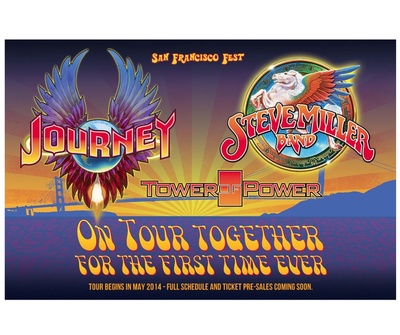

A Conversation with Steve Miller and Journey's Neal Schon & Jonathan Cain
Mike Ragogna: Journey and the Steve Miller Band recorded a few of the most popular albums ever made, especially Escape and Greatest Hits 1974-1978. And soon, you'll be touring together with Tower Of Power. What is it about your bands that resonated with pop culture?
Steve Miller: I think Journey and Tower Of Power and the Steve Miller Band, we're all part of the core of original groups in the San Francisco music scene. This is a social phenomenon as well as a musical phenomenon. These bands are an integral part of music and art and production of a whole new approach to music. Once you start changing the way people attend concerts, what happens to concerts, then you're in an unusual creative environment that San Francisco was in for three decades--really, the sixties, the seventies, and the eighties. There's really just an amazing amount of creativity that came out of there. I think that's what shaped bands like Journey and us. We made a lot of records. If you look at Journey, "Don't Stop Believing" and all the albums that they put out in a row--Infinity and then Evolution, Departure, Escape, Frontiers--that was like in five years. I think we put out five albums in the first eighteen months that we started recording. Five albums in eighteen months is pretty amazing. The creativity was fast and the response from the audiences was instant.
At the same time we're doing this, we were building brand new stages, brand new sound systems, brand new light shows. All that really added, I think, to what made the music mean more than just a string of hits. Tower Of Power is in there too. This is a phenomenal band. When you look at the music that came out of it, it makes sense that it's become so classic. Journey proves it, Tower Of Power proves it, people are still listening to these songs, they're still buying these songs and they're still coming out and they want to hear and see the bands perform. So that's a different thing from just producing hit music and writing hit singles. There's a lot more to it than just that music.
Neal Schon: I think the reason Journey is still prominent and out there is because we basically work our asses off and tour every year and continually play the music and have new audiences coming all the time, maintaining younger fans. Also I think we just got it right. We wrote a lot of really great songs, the three of us--myself, Steve Perry, and Jonathan Cain. We just got some things right, and I think that's why it's etched in stone.
Jonathan Cain: I'd say the thing is that time period that [we all] had our success, people were hungry for the combination. American music is blues, it's pop, it's soul, and it's the combination that makes it unique. I think all of us have that in common. We grew up loving soul and the blues and great melodies. I think the melodies were contagious, they were in the air, people wanted to be able to sing along with stuff, people wanted to party. We had Bill Graham, one of the greatest promoters of all time. He really invented the rock concert. He was a local guy who brought the Bay area together. We had the Bammies--the Bay Area Music Awards--a brotherhood celebration, if you will, of artists who shared the passion in the Bay area. It was a time and place when the Forty-Niners were close to the town and they would show up with Bill Graham at concerts.
I think we in the seventies and eighties enjoyed some of the greatest moments with our fans because the ticket prices weren't crazy, they were out there buying our albums--two hundred and fifty thousand a week. It's unheard of, that amount of participation with our fans, sharing this thing, and we happened to [be on] one of the greatest record companies in the business, Columbia. There were a lot of shiest-y ones that didn't pay you. But I have to say, Columbia always took care of us. Their army of soldiers helped sell these phenomenal records, well over a hundred million, which is hard to believe. We would not be the brand without all of those wonderful people who helped us in those years.
It took a village to make a hit record, to make brands like Journey and the Steve Miller Band last. We had the good fortune of having all of those people, the distributors, the handlers, the ones that got the records out to the stores before Best Buy and all these other people took over, that was amazing. You go to met these folks; they were grassroots people. We were very blessed to have that kind of backing. I think that contributes to a lot of our success today, while we were still out there doing it. Without the radio people--the DJs, the personalities, the Kid Leos of the world who promoted bands and had you on the radio that wanted to know how you were and had you on an interview; those kind of things where you actually went on a radio station and talked to the city and checked in with those people. "How are you doing?" That was an amazing time, where artists really got a look at the fans they were looking at, taking phone calls on the air, and really, really knowing your audience, looking them in the eye, saying, "Yeah!" Me joining Journey with Steve Perry was a crapshoot. They picked me out of The Babys and little did I know how much Steve and Neal and I would have in common musically. Together, we wrote some pretty cool songs. I'm very proud of that.
MR: What advice do you have for new artists?
NS: My son is an aspiring guitarist and he's amazing, I'm always looking for ways to help him out and get him out there--with the demise of record stores and pretty much the whole record industry I tell him, "You've got to go out and you have to play and you have to be seen." It's very difficult, I realize it is, for young artists to be seen because it's so backwards. It's A-S-S-backwards! You have to pay to play a lot of times in these clubs, a lot of Mom & Pop clubs are closing down, so it's very difficult. But I just say, "Jam with whomever you can, who's got a decent name and a decent band and be seen as much as you can in a live sense."
JC: My advice to new artists is to be true to what you believe you're best at, and not to try to chase the trend. If you're a hip-hop guy, stay a hip-hop guy. If you're a rock guy, be the best rock guy you can be. Go with your strengths and try to get your music and your brand out there on the internet. It's really the best place, with social media and all these sites that you can go on and put your music out there. Just try not to give it away. That's the one problem...people are giving out their music for free.
MR: Steve, what is your advice for new artists?
SM: My advice for new artists is to forget about all of this and take acting and dancing lessons and become a video star.
MR: [laughs] But what if they'd prefer to play music?
SM: I'll tell you the truth. When I started playing, the only hope there was, was to work in night clubs. This was before San Francisco. When San Francisco opened up, I left Chicago where I played with Muddy Waters and Howling Wolf and James Cotton and Junior Wells and Buddy Guy and immediately went to San Francisco because it was a chance to play in a ballroom to twelve hundred people instead of a bunch of drunks in a nightclub. It's sort of like the same world for new artists. It seemed impossible when I was a kid. I never thought that I would be able to make any kind of records and never thought seriously about a musical career because a musical career was being Fabian or Frankie Avalon or something. It didn't make any sense. There wasn't any possibility to get into that world.
It's kind of like that for kids now. I just had an eighteen year-old kid opening for me in Canada a couple weeks ago, Matthew Curry. Wonderful guitar player, great songwriter, in the Stevie Ray Vaughan area of virtuosity and originality. He's really great. I'm looking at this kid and he's driving in a van so he can open for us. I brought him up on stage to play with us and I'm sitting there trying to figure out, "How is this kid going to actually make it in this world where it takes five million dollars and a corporate sponsorship from Pepsicola to have a hit record nowadays?" It takes thirty million dollars to sell two million albums; it's crazy.
I don't really have any instant advice for these kinds of kids except to be true to yourself. Suffer for your art and hang on and maybe something will change where you actually have a chance. Right now, I don't think they have much of a chance. I think all this "Get it on the internet!" stuff is BS and nonsense. You have to really connect with people. There aren't very many clubs, there's no place for people to develop and play. It's a bad time right now for young artists. It's not always about huge, giant commercial success; it's about art, it's about creativity, it's about virtuosity. I worry about that, because it doesn't look really good, but when I was a kid, it didn't look good either. Big time success then was to be on a bus with seven other bands doing a gig where you did ninety shows in eighty days. I wasn't kidding when I said, "Take acting lessons and work on your video," because without that...
JC: Steve, we can look at a guy like Joe Bonamassa. I wrote a couple of songs on his album and Joe has forged a career out of basically using internet and his live playing and staying current with his fans and has made a career.
SM: Joe's like me! He's a guy who won't be denied. Joe Bonamassa's been grinding now for twenty years. He plays club by club, small gig by small gig, going to Europe and working and working and working and working and working and people love him and he's a great guitar player. He should be forty times the size of the artist he is.
JC: Sure, but he's still surviving in this business. My hat goes off to him.
SM: Oh, me too. My point is he's tougher than five thousand other guitar players for all those reasons. That's how hard it is to actually make it. He's a perfect example of somebody who's really, really strong and works really hard. He knows who he is and what he's doing; he's not some talented little kid with a manager who's going to make his career. That's rare...that's really, really rare. There are a lot of great guitar players that you never get to hear. It's been that way all my life. You finish doing a gig in front of twenty thousand people and go back to the hotel to The Boom-Boom Room at the top of The Sheraton and there'll be some guy in there who will blow you away that nobody will ever hear of because they're not tough enough to win in this gangster world of music, you know?
Transcribed By Galen Hawthorne
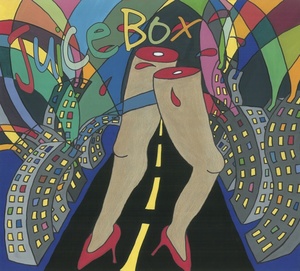
A Conversation with JuiceBox and The Rad Trad's Jamie Eblen
Mike Ragogna: Jamie! Okay, first of all, what is JuiceBox up to lately?
Jamie Eblen: JuiceBox is in a transitional phase. We just started working with new management and getting new gig opportunities. We also recorded an EP, First Cut, about a year ago, and at this point we've got about two more EPs' worth of material, so we're trying to figure out a time to get back into the studio more. And we're gearing up for some shows this summer, so lots of things are in the works.
MR: Great. What are you doing regarding the EP? Is it only online, or are you pressing physical products?
JE: We do have physical CDs that you can order off our website, and we've also been making downloads available through iTunes and Band Camp, as well as CD Baby and I think Amazon.
MR: Do you find there are more sales from downloads or CDs?
JE: I'd say we get more downloads because the only place we're really selling CDs is at shows, and the sales there are definitely less. It's an impulse buy in a lot of ways.
MR: Gotta have the swag too, no?
JE: We're working on getting some merchandise together. We don't have shirts or anything like that at this point. It's pretty much the CDs and the business cards... so you know where to find us!
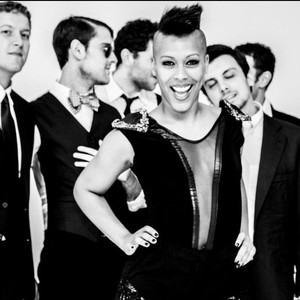
photo courtesy of JuiceBox
MR: [laughs] How did you get your gig with JuiceBox?
JE: I was the last member to come in. The band kind of formed out of a collection of people at NYU. Our singer, Lisa Ramey, is the only other one who didn't go to NYU, and I came on late in the game because they were going on a tour to Italy and the drummer couldn't make it. Nick Myers, the saxophone player, called me and said, "Hey, man, you wanna go to Italy?" I had just come back from study abroad in Florence for five months, and I was about to jump on any opportunity to go back to Italy, so that's kind of how I came into it. They had existed for about a year or two before I joined them.
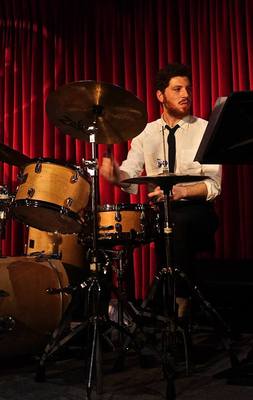
photo credit: Daniel Gootnick
MR: But you came into it with a solid jazz background, in addition to a rock background.
JE: Yeah. My favorite drummer hands down is John Bonham, so I'm always coming from that and the jazz perspective, as well as funk and soul. But the band definitely has a jazz vibe to it, with the horns, guitar and organ; our organist Dave Mainella is fantastic. So it's got a lot of different stuff happening, which is what I really enjoy about the band.
MR: Your parents, Ed Eblen and writer Robyn Flans, are pretty much music biz fixtures.
JE: They definitely are. Both have great faith in music, my dad being a drummer and my mom being a person who writes about drummers and musicians. So it's been a life full of music education.
MR: Your dad taught you how to play, right?
JE: Yeah. I spent a lot of time digging up old drums with my dad and figuring out how to play rock beats that he taught me. When I was really young I had a little CB drum set. I got that when I was in sixth grade, and he taught me rock beats. Also he and my mom hooked up Ed Shaughnessy's old drum set to be in my bedroom. So that was kind of amazing to have that.
MR: Was that inspirational?
JE: A little bit, yeah. The first groove I learned on that drum set that my dad helped me with was the "Come Together" groove.
MR: Nice. Your dad's very experienced, having played in a lot of clubs and with different bands in California, Nashville, and all sorts of places.
JE: Yeah, Vegas, Nashville, New York recently; many different places. So over the course of time I imagine I will have travelled a lot of the same places as he has. I just went on tour with another band, and I was calling him from different places, like, "Hey, I'm in Indiana now, you ever been here?" It was funny.
MR: What are the elements of JuiceBox, insofar as how do you guys create the material?
JE: I would say it's very democratic; someone brings an idea or a really fleshed-out song, it varies, and then we all sit together, play through it a bunch, talk about it, but we try to keep it mostly to the playing. I find that, as a band, when we get to work and just play the song over and over it sort of evolves over the course of a rehearsal. And then we record a tape, send it out, everyone listens to it, and then we workshop it the next time. But it all starts either with a jam vibe, which I'd say is less happening now because everyone's bringing songs to the band then having band fully flesh them out. Or people will bring out fully written out charts. It varies.
MR: Are you hoping the listener is grooving to the music and wants to dance to it, and/or do you want them to just sit back and listen to the arrangements?
JE: Ideally, we play a room with a wide-open floor, no tables, no chairs, and a lot of people. That's our ideal room. But we do a lot of other stuff. We play this club in New York called The General, and that's much more of a dinner club vibe, and they've got tables and chairs and people sit. And they're grooving, and I'd say that's what we want. We want people grooving. If they're grooving in their chairs, that's fine with me.
MR: Did you bring in any of your Broadway experience into the group, you know, because you've been in Broadway musicals, etc.?
JE: Yeah. I've worked with Jason Robert Brown on various projects; Honeymoon in Vegas the most recent. There are a lot of things I bring from that experience. They all inform one another--the JuiceBox experience, the musical theater thing, playing a lot of different percussion, I'd say is an interesting thing about the Broadway world that I would be carrying over into JuiceBox. It's hands-on a lot of different stuff which is a great sound for both vibes.
MR: You're based out of Brooklyn. So they actually have music in Brooklyn? Whaaa?
JE: [laughs] I think it's at a great place. There's a lot of great music to find pretty much every night, and a lot of it's close to me, and there're music clubs opening up all the time. I'd say it's definitely a burgeoning scene. I don't know if there's anything specifically at the helm of the Brooklyn scene because there are so many different things happening. It's indie, and whatever it is that encompasses that. Folk rock; funk and jazz; it's kind of a hodgepodge, which I think is what Brooklyn's great at, but it's also not necessarily focused. Right where I live in Prospect Heights there's two jazz clubs within walking distance, and lots and lots of musicians. We have sessions at my apartment all the time with various jazz guys, or the Trad jazz band that I have.
MR: So, Jamie Eblen of Juicebox and let's not forget The Rad Trads. What do you want to do with your life, young man!
JE: [laughs] It's an interesting time right now. There's a lot of different stuff that's happening, but not necessarily a lot of stuff that's happening right now, if that makes sense. This Broadway thing's on hold; all this JuiceBox stuff is happening, and JuiceBox is my passion project; I write for this band and it's very important to me. So I'm trying to go where the wind blows me, but I'm still involved in all of these things which is ideally what I want. It's a limbo moment.
MR: What influences have Brooklyn and Manhattan had on your music?
JE: The vibes from across the river and in Brooklyn are very different, but you can find a lot of the same things in both places. I'd say every time we play a Brooklyn show, we're playing to a lot of really excited young people, which is what we love to do. People who are either just out of school, still in school, or ten years out of school. And sometimes when we play Manhattan, especially at more dinner club vibes, that's definitely an older crowd sitting and grooving to the music, which we love equally as much. But it is a much different vibe and we bring a different energy...not that we bring a different energy, but there's a different energy in the room when we play those opposing shows.
MR: Where to do you feel jazz is going?
JE: Honestly, I don't know. Modern jazz is modern jazz and that will be a thing that's happening. I listened to a lot of it years ago, and my personal taste has taken me elsewhere. I'm sure I'll come back to it, but there's an interesting resurgence of hot jazz and that kind of thing in New York City. People love that, and there's tons of it.
MR: Does it feel like your career is coming at you quickly now?
JE: It's kind of an illusion; it feels like that, but it's not necessarily the case. I'll wake up every day and think, "Okay, same thing," and I never think it's going to be a thing where I wake up and something's different. But as I said, a lot of things are on hold, so it seems like I'm just in a crazy place.
MR: You also have a wonderfully talented musical sister, Taylor Leigh Eblen, right?
JE: [laughs] I do. She's currently working on her teaching degree at Queens College. She's doing really well, she loves teaching and working with kids.
MR: Does she ever jam with you?
JE: Most recently, we've just been working on music together. She has to learn a lot of percussion and other instruments for her classes. She has to be able to do everything at least a little bit, so I've been working with her on percussion stuff, so we haven't really had time just to jam recently.
MR: Do you think that may be coming down the pike at some point? The Eblen assault on the music world?
JE: Definitely. I'd love to collaborate with her and record some stuff.
MR: What's your advice for new artists?
JE: It depends on where you are. I'm very New York City-minded right now, but I'd say to just keep on keeping on. That's my thing, because you go through very different phases, highs and lows, and you have to be as stable as you can be and still enjoy every moment of it.
MR: Stable as in trying to have a stable life?
JE: Stable as in not letting what you do affect how you live. If things aren't going well, then not treating that as an excuse to not live healthily.
MR: Nice. Speaking of living healthily, rumor has it you currently are living in an apartment with about ten people...
JE: [laughs] I'd say during the weekdays, it's five and during the weekends, it's twelve. We have a lot of people coming through this apartment--people from Boston, people from Philly, etc.; friends to play music. It's crazy but it's really fun. So yes, I currently live with four other guys also doing music and writing-relating adventures.
MR: Has the environment evolved into a workshop?
JE: Yes, in a lot of ways. Everyone's been picking up the sticks recently and we have drum circles, and people listen to other people's songs and we learn and play them, so it's a pretty cool vibe we've got going on here.
MR: We spoke about Manhattan and Brooklyn, but you've been a bit of a globetrotter, as well. Is it a goal to play more places in the world?
JE: Oh, definitely. That's a major goal for me. That's my motivation for all of this, the motivation to travel. I love doing that and playing music abroad and experiencing different cultures, through music especially. I find that sharing that experience with any audience is pretty universal, but it's also different in each place you go, and that I love. JuiceBox went to Italy twice now, and both times were so incredible.
MR: How do you picture yourself five years from now?
JE: That's a tough question. I'm loving living in New York City right now, but I would say that with how expensive things are here, I would need to be at the next level musically, gigging and all that, just to be able to live comfortably. And going back to L.A. isn't really a thing I want. In five years I want to be here but also traveling. I'd love that. Spending a little time in New York and a lot of time somewhere else, and using New York as a launching pad. Traveling the US is something I'd really like to do, too, because I haven't done a lot of it.
MR: Think you might be working on any sort of father/son project with your dad?
JE: There's been nothing talked about, but that sounds awesome. I'd definitely be down to record some drums. We've jammed and worked on music in the past, but nothing is officially documented, and that is something to be done.
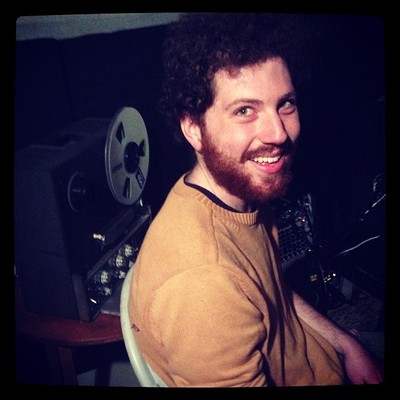
photo credit: Michael Fatum
Transcribed by Emily Fotis
